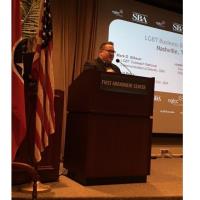For large companies such as KPMG, there is a strong business case for diversity — not just among its workers, but among its suppliers.
KPMG procurement manager Tim Ruddell stressed that point Wednesday as he encouraged LGBT business owners to gain LGBT Business Enterprise certification that could boost their procurement with private sector companies. The National Gay & Lesbian Chamber of Commerce approves certification and has partnered with the U.S. Small Business Administration to help companies maximize the benefits of the certification.
“Certification makes finding diverse suppliers easier,” Ruddell said. “We are fighting for the best suppliers. … If we are not open to the full breadth of talent, we are missing out in terms of value, in terms of innovation, in terms of getting the best price.”
After becoming an NGLCC corporate partner, KPMG increased its annual spending with certified LGBT businesses to $10 million, up from zero dollars, Ruddell said. The initiative has led to greater diversity within KPMG’s supply chain, while LGBT suppliers significantly increased their overall business.
The NGLCC works with Fortune
“It’s vitally important for these companies to have equal access to these opportunities,” NGLCC co-founder and President Justin Nelson said.
Nelson and Ruddell spoke as part of the SBA and NGLCC LGBT Business Builder series launched in 2015 as an effort to promote LGBT certification and the use of SBA programs.
“Our work with the Small Business Administration has now made the products and services that have always been there open and available in a welcoming way to LGBT people," Nelson said. "That’s incredibly important for the life and health of our small businesses and certainly of our national economy.”
While supplier diversity programs include LGBT-owned companies in the private sector, the federal government has yet to recognize LGBT-owned companies in its supplier diversity initiatives. Massach
Lisa Howe, executive director of the Nashville LGBT Chamber of Commerce, said she has been talking locally about LGBT business certification for four years and has experienced a range of reactions. She praised Audra Ladd, a manager at the city's economic and development division, for her immediate, positive reception to the needs of LGBT-owned companies.
Ladd said the city's diverse business procurement increased to 9 percent from 8 percent in the last year, a sign of improvement, but that those numbers need to increase. "We are committed to making sure you are feeling supported and doing what we can," she said.
While challenges remain in obtaining economic equality, progress in recent years has been encouraging, Nelson said.
“Companies want to do business with you, not despite the fact you are an LGBT businesses, but because you are LGBT,” Nelson said. “They want to be fully inclusive of all of the communities in which they live and work and that includes reflecting the employee base, reflecting the customer base and now reflecting the supplier base.”
Reach Jamie McGee at 615-259-8071 and on Twitter @JamieMcGee_.

